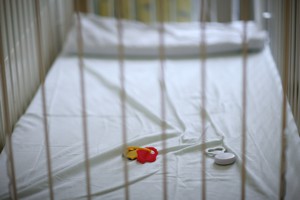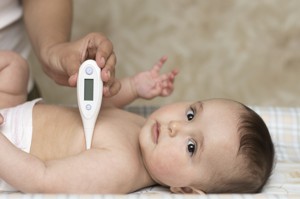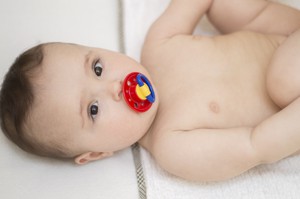 It’s every parent’s worst nightmare, and one that can seemingly happen without warning or explanation. Sudden Infant Death Syndrome (SIDS), often referred to as “Cot Death” is the diagnosis given when a baby dies unexpectedly with no apparent cause.
It’s every parent’s worst nightmare, and one that can seemingly happen without warning or explanation. Sudden Infant Death Syndrome (SIDS), often referred to as “Cot Death” is the diagnosis given when a baby dies unexpectedly with no apparent cause.
Should I Be Worried About SIDS?
Thankfully, cases of SIDS are extremely rare in the UK, affecting around 300 babies per year, which accounts for around one in every 3000 births. So, whilst it’s easy and understandable to become anxious about the issue, particularly if you are a first time parent, it’s important to remember that the chances of it happening to your baby are minimal. Furthermore, there are steps that you can take to significantly reduce the risk of SIDS.
What Causes SIDS
There is no clear explanation as to why some babies are affected by SIDS. Some recent research suggests that babies who are affected are unable to wake up when they are struggling with oxygen supply and that brain abnormalities in areas that control respiration and heart rate may be a factor. It’s thought that these abnormalities, when combined with other factors, such as infection or the environment, may lead to a baby becoming more vulnerable to SIDS.
How To Reduce The Risk Of SIDS
 There are some factors that increase your baby’s risk of being affected by SIDS that, unfortunately, cannot be avoided. These include:
There are some factors that increase your baby’s risk of being affected by SIDS that, unfortunately, cannot be avoided. These include:
- Age of the baby – Babies are most at risk between the ages of 2 and 4 months (The risk reduces significantly once the baby is six months old)
- Premature birth or low birth weight
- Having a sibling who previously died as a result of SIDS
- Being one of a multiple birth
- Mother’s age – babies of mothers under 20 are more likely to be affected
- The gender of a baby – boys are slightly more likely to be affected
- Ethnicity – In the US, studies have shown that African Americans and Native Americans have higher rates than SIDS than White Americans
- Poverty – Babies born into households considered to be in relative poverty have a higher risk
However, there are also a number of simple steps that you can take to significantly reduce your baby’s risk of SIDS.
Sleep Positions & Bedding
A lack of oxygen supply is thought to be a factor in SIDS and, therefore ,your baby’s place of sleep should be somewhere where he or she can breathe freely. When putting your baby down to sleep, always place them on their back. Your parents or grandparents may have been told to put you to sleep on your tummy, however, it’s important to note that this advice has been changed following extensive research and the current recommendation is to always put your baby to sleep on their back.
Make sure that any relatives who may also be putting your child to sleep are aware of this. Once your baby is able to roll over you may find that they regularly turn and sleep on their stomach, however, you should not be alarmed at this as by this stage the risk of SIDS has dropped significantly.
A firm, flat, waterproof mattress should be used and ideally your baby should be placed in their own crib or Moses basket. If you want to co-sleep, then consider purchasing a co-sleeping crib that attaches to the side of your bed as this gives you the best of both options. Whilst co-sleeping can be done safely, most experts agree that your baby having their own space to sleep in is significantly safer. In addition, experts recommend that the baby sleeps in the same room as their parents for the first six months of their life to further reduce the risk.
Your baby’s crib or Moses basket should be free of soft toys, pillows, crib bumpers, etc. Only blankets or a baby sleeping bag should be used, no duvets. Your baby should be placed in the crib or the basket with their feet touching one end, so that he or she cannot wriggle under any blankets.
Never, ever, fall asleep with your baby on the sofa or in bed with your baby on your chest. If you are struggling to stay awake during night time feeds then ask your partner for support.
Temperature
 It’s thought that temperature is a risk factor with SIDS. The ideal temperature for your baby’s room is around 18 degrees centigrade. Make sure your baby is not too hot or too cold, and add or remove layers if necessary, and never use a hat or any other cover on your baby’s head. When checking your baby, place your fingers on his or her neck rather than their hands. This is because hands can often be cooler than the rest of the body and give a false indication of temperature. If your baby’s neck feels hot or cold you can respond accordingly.
It’s thought that temperature is a risk factor with SIDS. The ideal temperature for your baby’s room is around 18 degrees centigrade. Make sure your baby is not too hot or too cold, and add or remove layers if necessary, and never use a hat or any other cover on your baby’s head. When checking your baby, place your fingers on his or her neck rather than their hands. This is because hands can often be cooler than the rest of the body and give a false indication of temperature. If your baby’s neck feels hot or cold you can respond accordingly.
Smoking
Research suggests that cigarette smoke is a major factor in the cause of SIDS. In fact, statistics show that babies born to a mother who is a smoker are three times more likely to die from SIDS. Furthermore, smoke from other people around your baby can also increase the risk significantly. This is thought to be because cigarette smoke hampers your baby’s respiratory system’s ability to function normally, leading to breathing problems that result in SIDS. If you need help to stop smoking you can sign up for support from the NHS. Make sure that any friends and family who are smokers are not permitted to smoke around your baby.
Alcohol & Drugs
If you or your partner are impaired from alcohol or drugs, prescription or otherwise, you should not share a bed with your baby. This is because there is an increased risk of you rolling onto your baby and not noticing.
Breastfeeding
There is some evidence to suggest that breastfed babies have a lower risk of SIDS, possibly because of a boost to the immune system that breastmilk provides.
Dummy / Pacifier
 The use of a dummy has been shown to also reduce a baby’s risk of SIDS. Although the reason is unclear, one theory is that it is because babies with dummies sleep lighter than those without, and so are more likely to be able to wake up in the event of encountering respiratory problems. More recent research also suggests that dummies do not affect breastfeeding in any way. However, it is recommended that your baby does not use a dummy past one year of age in order to prevent any problems developing with their teeth.
The use of a dummy has been shown to also reduce a baby’s risk of SIDS. Although the reason is unclear, one theory is that it is because babies with dummies sleep lighter than those without, and so are more likely to be able to wake up in the event of encountering respiratory problems. More recent research also suggests that dummies do not affect breastfeeding in any way. However, it is recommended that your baby does not use a dummy past one year of age in order to prevent any problems developing with their teeth.
If you decide to give your baby a dummy to reduce the risk of SIDS you could consider only giving it to him or her for naps and night time sleep, to avoid them becoming overly dependent on it for comfort. If your baby spits out the dummy at night, you should wait until they are awake again before replacing it in their mouth, and never try and put it in when they are asleep.
Vaccinations
Your baby will be offered their first vaccinations at two months, with additional vaccines given at 3 months, 4 months, and one year, plus additional boosters during childhood. Whilst vaccines are important for your baby’s overall health, research has shown that they have the additional benefit of reducing a baby’s risk of SIDS by up to half.
Sadly, due to negative publicity concerning a link between vaccines and autism, many parents have declined to have their child vaccinated, thus significantly increasing the risk of Sudden Infant Death Syndrome, in addition to an increased risk from previously eradicated and life threatening diseases.
It’s important to note that any research associating vaccines with autism has since been disproven and that vaccines are safe for your baby overall with only mild side effects in some cases, such as a sore arm. If you have any concerns about vaccination then please discuss your concerns with a qualified medical practitioner such as a GP or Health Visitor before making any decision.
